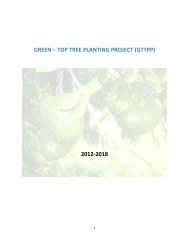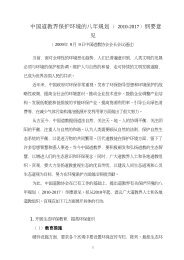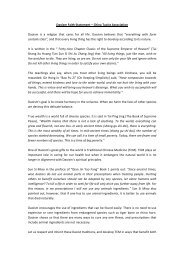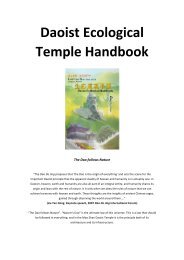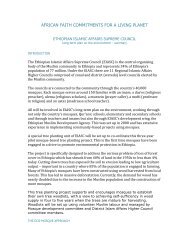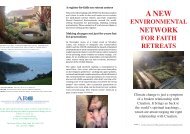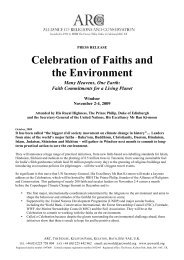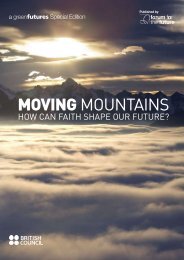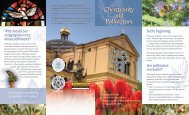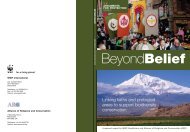summary paper - Alliance of Religions and Conservation
summary paper - Alliance of Religions and Conservation
summary paper - Alliance of Religions and Conservation
Create successful ePaper yourself
Turn your PDF publications into a flip-book with our unique Google optimized e-Paper software.
Saanen, Faith Liaison Office <strong>and</strong> Katherine Marshall, Senior Advisor HDNDE. As with past Faith <strong>and</strong><br />
Development Leaders Meetings, the focus will be on dialogue on a range <strong>of</strong> development issues.<br />
(ii) scale up the use <strong>of</strong> private sector instruments <strong>and</strong> channelling <strong>of</strong> funds, e.g. pension <strong>and</strong> investment<br />
funds <strong>of</strong> FBOs to be channelled to socially <strong>and</strong> environmentally responsible investments, as the case<br />
study on the investments <strong>of</strong> the church <strong>of</strong> Sweden <strong>and</strong> Norway in successful private sector forest<br />
exploration in Mozambique demonstrated. Links with the World Business Council on Sustainable<br />
Development also to be explored.<br />
(iii) focus on urban growth <strong>and</strong> the brown agenda. The success <strong>of</strong> FBO in Ghana in the clean up <strong>of</strong> the<br />
urban environment could serve as an example to all country teams. The Ghana CT basically acted as a<br />
catalyst bringing the FBO together with just some minor funding from the TFESSD.<br />
(iv) focus on key strategic themes <strong>and</strong> bring key players together, e.g. FBO provide staggering amounts<br />
<strong>of</strong> education (<strong>and</strong> health) services all over the world. What influence could the FBO have on the learning<br />
<strong>of</strong> young people re. environmental issues.<br />
d. Carry out excellent analytical work, e.g. M <strong>and</strong> E work on the impact <strong>of</strong> the partnerships.<br />
Martin Palmer<br />
SecretaryGeneral, The <strong>Alliance</strong> <strong>of</strong> <strong>Religions</strong> <strong>and</strong> <strong>Conservation</strong> (ARC)<br />
ARC<br />
This is the next stage <strong>of</strong> an interesting evolution in the way donor countries <strong>and</strong> agencies have related to<br />
developing nations, communities <strong>and</strong> cultures. In the 1970s <strong>and</strong> 1980s the norm was that development<br />
agencies worked directly with governments in recipient countries. Later, corruption was perceived as a<br />
major factor that <strong>of</strong>ten prevented effective projects on the ground. James Wolfensohn in the World Bank<br />
raised this taboo subject very forcefully.<br />
In the 1990s there was a reaction – a popularly held sense that in order to be effective, development<br />
agencies should work outside the government. That was the decade <strong>of</strong> the NGOs. A problem is that<br />
many NGOs could be seen as clones, resembling their donors in almost every way, except that they are<br />
dependent. On the other side, donors see NGOs as service providers <strong>and</strong> as watchdogs.<br />
Recently the buzzword is a wider, more amorphous body called “civil society”. Up until now the faiths<br />
have rarely been invited to the table except in their NGO incarnations (eg Christian Aid, Caritas) <strong>and</strong> Rick<br />
Scobey talking about recent meetings he has been to underlined the fact that most <strong>of</strong> the time religious<br />
groups had not been invited to the table as part <strong>of</strong> the civil society. Today, if development agencies are<br />
considering inviting the faiths to become partners, this is the next natural stage <strong>of</strong> evolution. There is no<br />
suggestion that they should ever be the only voices, but that in a plurality <strong>of</strong> groups, the faiths should<br />
always be there.<br />
Sometimes people ask: where are the faiths The truth is that many <strong>of</strong> he faiths have been working on<br />
“development issues” themselves all along. They have schools, forests, hospitals, old people’s homes,<br />
gardens, farms, small industries, buildings – <strong>and</strong> they too have been looking at issues like poverty<br />
reduction, organic farming, forest management – using their own language <strong>and</strong> teachings. And if the<br />
development organizations know little <strong>of</strong> this, it is perhaps simply because they have never asked. In<br />
many countries the faiths are the only providers <strong>of</strong> education, health services <strong>and</strong> so on because the<br />
governments have not been able to <strong>of</strong>fer these services or they have given them back to the faiths.<br />
Here are some examples:<br />
* The World Council <strong>of</strong> Churches set up a full time department <strong>of</strong> climate change in 1990, after a group <strong>of</strong><br />
Christian women on isl<strong>and</strong>s in the South Pacific came to them <strong>and</strong> said that their l<strong>and</strong>s were<br />
disappearing.<br />
58



